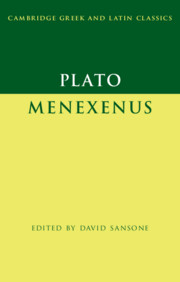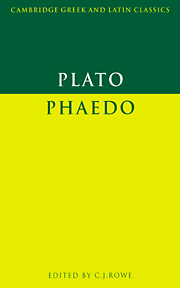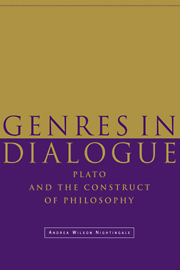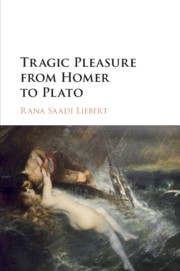Plato: Menexenus
$39.99 ( ) USD
Part of Cambridge Greek and Latin Classics
- Date Published: August 2020
- availability: This ISBN is for an eBook version which is distributed on our behalf by a third party.
- format: Adobe eBook Reader
- isbn: 9781108606332
Find out more about Cambridge eBooks
$
39.99 USD
( )
Adobe eBook Reader
Other available formats:
Hardback, Paperback
Looking for an examination copy?
If you are interested in the title for your course we can consider offering an examination copy. To register your interest please contact [email protected] providing details of the course you are teaching.
-
Plato challenges his readers by depicting an elderly Socrates as an enthusiastic student of rhetoric who has learned from his teacher Aspasia to recite an inspiring funeral oration, an oration that conspicuously refers to events occurring after the deaths of Socrates and Aspasia, an oration that Aspasia, as a woman and a non-Athenian, was not eligible to deliver over the Athenians who died in war. This commentary, the first in English in over 100 years, assists the modern reader in confronting Plato's challenge. The Introduction sets the dialogue in the context of the traditional Athenian funeral oration and of Plato's ongoing critique of contemporary rhetoric. The Commentary, which is well suited to the needs and interests of intermediate students of Classical Greek, provides guidance on grammatical and historical matters, while allowing the student to appreciate Plato's mastery of Greek prose style and critique of democratic ideology.
Read more- Integrates literary, rhetorical, and historical discussion and comments in order to show how Plato uses rhetorical means to misrepresent and distort historical reality
- Provides grammatical help for students as well as introducing techniques of discourse analysis
- Helps students appreciate the radically divergent interpretations of the text proposed by scholars
Reviews & endorsements
'Sansone's Menexenus constitutes an intelligent, learned, and welcome attempt to take a dialogue often considered peripheral and return it to the center of Plato's philosophical concerns. In this as in other ways, it succeeds admirably.' Geoff Bakewell, Bryn Mawr Classical Review
Customer reviews
Not yet reviewed
Be the first to review
Review was not posted due to profanity
×Product details
- Date Published: August 2020
- format: Adobe eBook Reader
- isbn: 9781108606332
- availability: This ISBN is for an eBook version which is distributed on our behalf by a third party.
Table of Contents
Introduction
1. The Athenian state funeral
2. The epitaphios logos
3. The Menexenus of Plato
A note on the presentation of the text
Text
Commentary
Bibliography.
Sorry, this resource is locked
Please register or sign in to request access. If you are having problems accessing these resources please email [email protected]
Register Sign in» Proceed
You are now leaving the Cambridge University Press website. Your eBook purchase and download will be completed by our partner www.ebooks.com. Please see the permission section of the www.ebooks.com catalogue page for details of the print & copy limits on our eBooks.
Continue ×Are you sure you want to delete your account?
This cannot be undone.
Thank you for your feedback which will help us improve our service.
If you requested a response, we will make sure to get back to you shortly.
×





